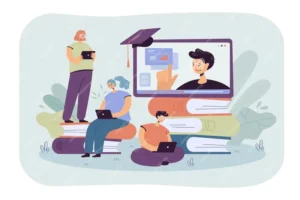Virtual Communities in Online Learning: Why They Matter

The advent of online learning has reshaped the education landscape, making knowledge accessible to learners across the globe. In this digital age, the role of virtual communities within online learning environments cannot be overstated. This article explores the significance of virtual communities in online education and why they matter for both students and educators.
Contents
Understanding Virtual Communities
A virtual community in the context of online education refers to a group of learners, instructors, and sometimes administrators who connect, communicate, and collaborate through digital platforms. These communities can take various forms, including discussion forums, social media groups, and collaborative project spaces. Here’s why they matter:
- Fostering Engagement and Motivation:
- Virtual communities create a sense of belonging, making learners feel more connected to their peers and instructors.
- Engaged students are more motivated, participate actively in discussions, and are more likely to complete courses successfully.
- Enhancing Learning Outcomes:
- Collaborative learning within virtual communities stimulates critical thinking and problem-solving.
- Learners benefit from exposure to diverse perspectives, gaining a broader understanding of subjects.
- Providing Support and Assistance:
- Virtual communities offer a platform for learners to seek help, share resources, and collaborate on projects.
- Instructors can provide timely feedback and guidance, enhancing the learning experience.
- Personalizing Learning:
- Through virtual communities, educators can tailor content and support to individual learners’ needs, promoting personalized learning paths.
- Building Lifelong Connections:
- Virtual communities often lead to long-lasting connections. Alumni networks, for instance, provide ongoing support and professional opportunities.
Why Virtual Communities Matter
- Mitigating Isolation:
- Online learners can often feel isolated due to the absence of physical classrooms and face-to-face interactions.
- Virtual communities counteract this isolation, creating a supportive learning environment.
- Enhancing Communication:
- Communication within virtual communities is not bound by geography or time zones. Learners can engage in discussions and seek help when it suits them.
- This flexibility accommodates diverse schedules and learning preferences.
- Promoting Diversity and Inclusivity:
- Virtual communities bring together individuals from various backgrounds, cultures, and perspectives.
- Inclusive discussions enrich the learning experience by exposing learners to a wider range of ideas.
- Supporting Lifelong Learning:
- Lifelong learners increasingly turn to virtual communities to acquire new skills, share knowledge, and stay updated in their fields.
- Virtual communities facilitate continuous learning beyond traditional educational institutions.
- Adapting to the Digital Age:
- In today’s digitally connected world, the ability to engage in virtual communities is a valuable skill in itself.
- Learners develop digital literacy and effective online communication skills.
Strategies for Building Strong Virtual Communities
- Establish Clear Expectations:
- Communicate guidelines for participation, respectful discourse, and academic integrity within the community.
- Encourage Participation:
- Instructors should actively participate in discussions, offering insights and guidance.
- Peer-to-peer engagement should be encouraged and valued.
- Use Collaborative Tools:
- Implement collaboration tools, such as shared documents and video conferencing, to facilitate group projects and discussions.
- Provide Timely Feedback:
- Instructors should offer prompt feedback on assignments and participation, showing that contributions are valued.
- Celebrate Achievements:
- Recognize and celebrate milestones, achievements, and contributions within the virtual community.
Conclusion
Virtual communities are the beating heart of online education. They foster engagement, motivation, and collaboration, creating a sense of connection that mitigates the isolation often associated with online learning. As the digital landscape continues to evolve, virtual communities will remain essential in shaping the future of education. Educators, institutions, and learners should recognize their significance and actively nurture these communities to ensure a more enriching and fulfilling online learning experience.









